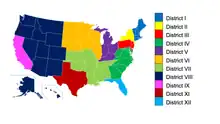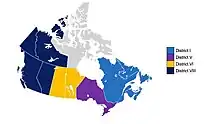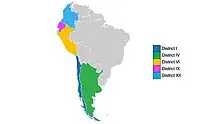 | |
| Formation | 1951 |
|---|---|
| Products | Obstetrics & Gynecology |
| Website | www.acog.org |
The American College of Obstetricians and Gynecologists (ACOG) is a professional association of physicians specializing in obstetrics and gynecology in the United States. Several Latin American countries are also represented within Districts of the organization. It is a 501(c)(3) organization with a membership of more than 60,000 obstetrician-gynecologists and women's health care professionals.[1] It was founded in 1951.
Background
A companion 501(c)(6) organization, the American Congress of Obstetricians and Gynecologists, was founded in 2008 and became operational in 2010.[2] The two organizations coexist, and member individuals automatically belong to both.[3] Both are not-for-profit.[3] The College as a 501(c)(3) focuses on education (with limited political work), whereas the Congress as a 501(c)(6) is allowed to advocate for members' interests in terms of the business of medicine (BOM) through lobbying and other political work.[3] Their main advocacy focuses on women's reproductive health, specifically opposing political interference in abortion access.[4] Physician members are referred to as fellows and use the post-nominal letters FACOG to indicate their status. To become a fellow, a candidate must become certified by the American Board of Obstetrics and Gynecology,[5] an independent organization, and then nominated to the College by another fellow. Non ObGyn professionals may join as an Allied Health Professional, but must meet their standards of education.[6]
Obstetrics & Gynecology is the official publication of ACOG. It is popularly known as "The Green Journal".[7] In 1986, the organization successfully challenged an anti-abortion law in Pennsylvania before the U.S. Supreme Court in Thornburgh v. American College of Obstetricians and Gynecologists.[8]
Districts and Sections
North America
United States

| District | Member States |
|---|---|
| I | Connecticut, Maine, Massachusetts, New Hampshire, Rhode Island, Vermont |
| II | New York |
| III | Delaware, New Jersey, Pennsylvania |
| IV | District of Columbia, Georgia, Maryland, North Carolina, South Carolina, Virginia, West Virginia |
| V | Indiana, Kentucky, Ohio, Michigan |
| VI | Illinois, Iowa, Minnesota, Nebraska, North Dakota, South Dakota, Wisconsin |
| VII | Alabama, Arkansas, Kansas, Louisiana, Mississippi, Missouri, Oklahoma, Tennessee |
| VIII | Alaska, Arizona, Colorado, Hawaii, Idaho, Montana, Nevada, New Mexico, Oregon, Utah, Washington, Wyoming |
| IX | California |
| AFD1 | Air Force, Army, Navy |
| XI | Texas |
| XII | Florida |
| 1Armed Forces District (AFD) | |
Canada

| District | Member Provinces |
|---|---|
| I | New Brunswick, Newfoundland and Labrador, Nova Scotia, Prince Edward Island, Quebec |
| V | Ontario |
| VI | Manitoba, Saskatchewan |
| VIII | Alberta, British Columbia, Northwest Territory, Yukon Territory |
South America

| District | Member Country |
|---|---|
| I | Chile |
| IV | Argentina |
| VI | Peru |
| IX | Ecuador |
| XII | Colombia |
References
- ↑ "About Us". American College of Obstetricians and Gynecologists.
- ↑ "Leadership and Governance". ACOG website. ACOG. Retrieved 8 July 2015.
- 1 2 3 ACOG, The American College of Obstetricians and Gynecologists and the American Congress of Obstetricians and Gynecologists: What We Are and The Reasons Why (PDF), archived from the original (PDF) on 2015-06-04, retrieved 2015-10-29.
- ↑ "Policy Priorities". www.acog.org. Retrieved 2021-02-06.
- ↑ "American Board of Obstetrics & Gynecology". ABOG website. ABOG. Retrieved 13 February 2014.
- ↑ "Allied Health Professionals". www.acog.org. Retrieved 2021-02-06.
- ↑ SCImago Journal and Country rank > Obstetrics and Gynecology Retrieved on April 15, 2010
- ↑ Greenhouse, Linda. Becoming Justice Blackmun. Times Books. 2005. Page 183.
- 1 2 3 4 5 6 "Districts and Sections". www.acog.org. Retrieved 2023-08-13.